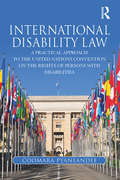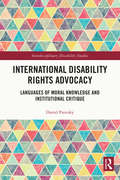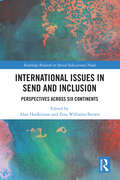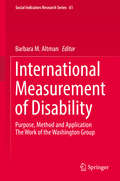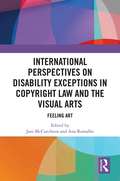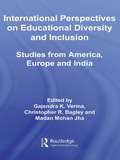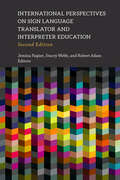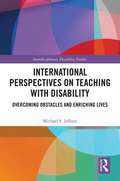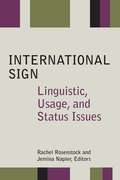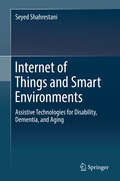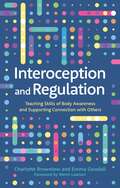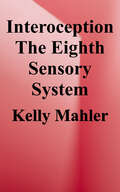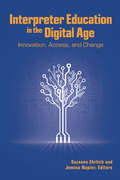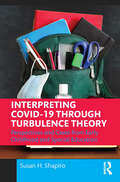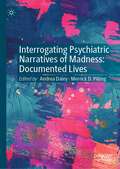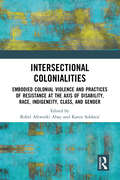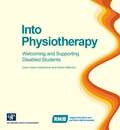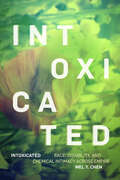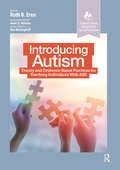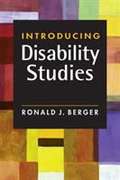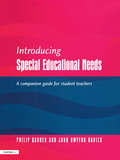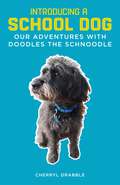- Table View
- List View
International Disability Law: A Practical Approach to the United Nations Convention on the Rights of Persons with Disabilities
by Coomara PyaneandeeThis book provides a concise guide to international disability law. It analyses the case law of the CRPD Committee and other international human rights treaty bodies, and provides commentaries on more than 50 leading cases. The author elaborates on the obligations of States Parties under the CRPD and other international treaties, while also spelling out the rights of persons with disabilities, and the different mechanisms that exist at both domestic and international levels for ensuring that those rights are respected, protected and promoted. The author also delineates the traditional differentiation between civil and political rights on the one hand, and economic, social and cultural rights on the other. He demonstrates, through analysis of the evolving case law, how the gap between these two sets of rights is gradually closing. The result is a powerful tool for political decisionmakers, academics, legal practitioners, law students, persons with disabilities and their representative organisations, human rights activists and general readers.
International Disability Rights Advocacy: Languages of Moral Knowledge and Institutional Critique (Interdisciplinary Disability Studies)
by Daniel PateiskyThis book provides insight into the globally interlinked disability rights community and its political efforts today. By analysing what disability rights activism contributes to a global power apparatus of disability-related knowledge, it demonstrates how disability advocacy influences the way we categorise, classify, distribute, manipulate, and therefore transform knowledge. By unpacking the mutually constitutive relations between (practical) moral knowledge of international disability advocates and (formal) disability rights norms that are codified in international treaties such as the UN Convention on the Rights of Persons with Disabilities (CRPD), the author shows that the disability rights movement is largely critical of statements that attempt to streamline it. At the same time, cross-cultural disability rights advocacy requires images of uniformity to stabilise its global legitimacy among international stakeholders and retain a common meta-code that visibly identifies its means and aims. As an epistemic community, disability rights advocates simultaneously rely on and contest the authority of international human rights infrastructure and its language. Proving that disability rights advocates contribute immensely to a global culture that standardises what is considered morally and legally ‘right’ and ‘wrong’, thereby shaping the human body and the body politic, this book will be of interest to all scholars and students of disability studies, sociology of knowledge, legal and linguistic anthropology, social inequality, and social movements.
International Issues in SEND and Inclusion: Perspectives Across Six Continents (Routledge Research in Special Educational Needs)
by Alan Hodkinson Zeta Williams-BrownInternational Issues in SEND and Inclusion brings together a collection of cutting-edge researches on approaches to special education needs and disability education, across 6 continents and within 12 countries. Written by authors who are experts in their own countries in relation to special educational needs and disability, the book provides a unique knowledge and understanding of different international perspectives in special educational needs, disability and inclusion. The chapters present extended case studies and reflect on current policy, practice and theory within that context, challenging assumptions which can dominate the policy and practice of inclusive education. Each of the six continents has a separate section and introduction within the book to offer a relevant approach and context for analysis. The book will be of great interest to academics, researchers and postgraduate students in the fields of inclusion, special educational needs and disability, teacher education and comparative education.
International Measurement of Disability
by Barbara M. AltmanThis volume provides an informed review of the accomplishments of the Washington Group on Disability Statistics (WG) in the provision of international data and statistics on disability. It does so within the context of the UN Convention on the Rights of Persons with Disabilities. The volume includes a description of the development and testing of a short set of questions for Censuses, now used in approximately 29 countries and recommended in the U. N. 's Principles and Recommendations for Population and Housing Censuses: The 2020 Round, which includes disability as a core topic to be collected in censuses. It discusses the experiences of several countries on the use of the WG questions and how this has impacted on national agendas in the area of disability. It follows the development and testing of an extended set of questions for use in national surveys other than censuses and examines the challenges of translation and the importance of generating comparable question sets in different languages and within different cultures. It studies the examination of cognitive testing techniques in a variety of countries, and presents the results of the first round of censuses in 2010 in countries using the six question set. The volume includes discussions of the new development of question modules on a broad range of child disability and functioning, and the environmental contexts of participation that are part of the current work of the WG. In addition, it contains a reflection on the use of the WG's functionality approach to identifying disabilities by humanitarian agencies to identify disabilities in populations of displaced persons. A thoughtful conclusion addresses what the development of cross-nationally comparable data can mean for the improvement of circumstances for all persons with disabilities.
International Perspectives on Disability Exceptions in Copyright Law and the Visual Arts: Feeling Art
by Jani McCutcheon and Ana RamalhoThis book provides an overview of disability exceptions to copyright infringement and the international and human rights legal framework for disability rights and exceptions. The focus is on those exceptions as they apply to visual art, while the book presents a comprehensive study of copyright’s disability exceptions per se and the international and human rights law framework in which they are situated. 3D printing now allows people with a visual impairment to experience 3D reproductions of paintings, drawings and photographs through touch. At the same time, the uncertain application of existing disability exceptions to these reproductions may generate concerns about legal risk, hampering sensory art projects and reducing inclusivity and equity in cultural engagement by people with a visual impairment. The work adopts an interdisciplinary approach, with contributions from diverse stakeholders, including persons with disabilities, cultural institutions and the 3D printing industry. The book sketches the scene relating to sensory art projects. Experts in intellectual property, human rights, disability and art law then critically analyse the current legal landscape relating to disability access to works of visual art at both international and regional levels, as well as across a broad representative sample of national jurisdictions, and identify where legal reform is required. This comparative analysis of the laws aims to better inform stakeholders of the applicable legal landscape, the legal risks and opportunities associated with sensory art and the opportunities for reform and best practice guidelines, with the overarching goal of facilitating international harmonisation of the law and enhanced inclusivity.
International Perspectives on Educational Diversity and Inclusion: Studies from America, Europe and India
by Gajendra K. Verma Christopher R. Bagley Madan Mohan JhaIn light of new theories of multiculturalism and globalization, this insightful book compares approaches to the educational inclusion of diverse minorities– such as the ethnic and linguistic minorities in America. Drawing on their extensive experience, the contributors examine: accounts from cross-cultural cognitive psychology on the special interests and educational needs of certain ethnic groups research on social class divisions, neighbourhood poverty and school exclusions in Britain educational developments for inclusion of minorities in Europe, Greece and Eastern Europe India's educational policies surrounding its struggle to achieve 'education for all' in a nation at the threshold of economic prosperity. This book is unique in its breadth, and scope of its integration of educational policy data generated by different countries, with contrasted minority populations, all at different stages of development.
International Perspectives on Sign Language Translator and Interpreter Education (Interpreter Education #14)
by Jemina Napier; Stacey Webb; Robert AdamThe field of sign language translator and interpreter (SLTI) education gets a global treatment in this new volume helmed by editors Jemina Napier, Stacey Webb, and Robert Adam. This second edition updates the information from the 2009 volume and adds new contributions that expand the scope of the work to include additional countries and topic areas. SLTI scholars and educators will benefit from these international perspectives and gain an improved understanding of this rapidly evolving discipline. Each chapter, authored collaboratively by deaf and hearing educators, surveys general interpreter education and training, examines the status of the profession for both deaf and hearing practitioners, and addresses specific challenges faced within the different national frameworks. Contributors also discuss ongoing and future trends, including the impact of the Covid-19 pandemic on educational practices. This volume disseminates extensive knowledge on sign language translator and interpreter education, covering established programs as well as ad hoc training, and highlighting effective teaching pedagogies and structured classroom strategies. Contributors emphasize a holistic approach to the field, integrating SLTI education, the current profession, future practitioners, and deaf communities. Although the state of the field varies widely around the world depending on the national context, this volume reveals a shared goal of advancing professional standards and improving the provision of service to deaf people worldwide.
International Perspectives on Teaching with Disability: Overcoming Obstacles and Enriching Lives (Interdisciplinary Disability Studies)
by Michael S. JeffressEfforts to reduce discrimination and increase diversity on campuses, coupled with shrinking budgets causing administrators to devote more resources toward recruiting and retaining students with disabilities, are fuelling an explosion of research in the area of inclusive education. An important focus that has been largely neglected is the place of teachers with disabilities in academe. International Perspectives on Teaching with Disability brings together 25 multi-disciplinary scholars with disabilities from Africa, Canada, the Caribbean, the UK, Israel and the United States to share their struggles and successes in teaching with disability. The 18 chapters are written largely from autoethnographic perspectives grounded in solid academic research but full of anecdotes and self-reflexive narratives that provide insights into the lived experiences of the authors. Woven into the narratives are discussions of the complexities of self-disclosure and self-advocacy; the varied—and often problematic—ways disability is experienced, perceived and discussed in society and in the classroom; the challenges of navigating academe with disability, the value of disability pedagogy, the positive student outcomes achieved by teaching through disability, as well as practical applications and lessons learned that will benefit educators, administrators and students preparing to become teachers. This book is written to champion the integral place and role of disabled educators in academe. Current educators with disability will be affirmed. Those with disability aspiring to become teachers will be encouraged. Temporarily able-bodied administrators and educators will be challenged. Everyone will be informed. This book will be a welcome addition to reading lists in a wide array of academic fields including: Education, Pedagogy, Disability Studies, Human Resources Management, and Sociology.
International Sign: Linguistic, Usage, and Status Issues
by Jemina Napier Rachel RosenstockInternational Sign (IS) is widely used among deaf people and interpreters at international events, but what exactly is it, what are its linguistic features, where does its lexicon come from, and how is it used at interpreted events? This groundbreaking collection is the first volume to provide answers to these questions. Editors Rachel Rosenstock and Jemina Napier have assembled an international group of renowned linguists and interpreters to examine various aspects of International Sign. Their contributions are divided into three parts: International Sign as a Linguistic System; International Sign in Action—Interpreting, Translation, and Teaching; and International Sign Policy and Language Planning. The chapters cover a range of topics, including the morphosyntactic and discursive structures of interpreted IS, the interplay between conventional linguistic elements and nonconventional gestural elements in IS discourse, how deaf signers who use different signed languages establish communication, Deaf/hearing IS interpreting teams and how they sign depicting verbs, how best to teach foundation-level IS skills, strategies used by IS interpreters when interpreting from IS into English, and explorations of the best ways to prepare interpreters for international events. The work of the editors and contributors in this volume makes International Sign the most comprehensive, research-based analysis of a young but growing field in linguistics and interpretation.
Internet of Things and Smart Environments
by Seyed ShahrestaniThis book is focused on the Internet of Things (IoT) services and smart environments that can be of assistance to the elderly and individuals living with dementia or some sensory impairment. The book outlines the requirements of the systems that aim to furnish some digital sensory or cognitive assistance to the individuals and their caregivers. Internet of Things and Smart Environments: Assistive Technologies for Disability, Dementia, and Aging covers the important evolutions of the IoT, the sensors, actuators, wireless communication and pervasive computing systems, and other enabling technologies that power up this megatrend infrastructure. The use of the IoT-based systems in improving the conventional assistive technologies and provisions of ambient assisted living are also covered. The book takes an impartial, and yet holistic, view to providing research insights and inspirations for more development works in the areas related to assistive IoT. It will show the potentials of using normally available interactive devices, like smartphones or smart TVs, which can be supplemented with low-cost gadgets or apps to provide assistive capabilities. It aims to accentuate the need for taking a comprehensive and combinatory view of the comprising topics and approaches that are based on the visions and ideas from all stakeholders. The book will examine these points and considerations to conclude with recommendations for future development works and research directions. This book can be of value to a diverse array of audience. The researchers and developers in healthcare and medicine, aged care and disability services, as well as those working in the IoT-related fields, may find many parts of this book useful and stimulating. It can be of great value to postgraduate and research students working in these areas. It can also be adapted for use in upper-level classroom courses relevant to communication and smart technologies, IoT applications, and assistive technologies. Many parts of the book can be of interest to the elderly and individuals living with a disability, as well as their families and caregivers. From an industry perspective, it can be of interest to software, hardware, and particularly app developers working on the IoT applications, smart homes and environments, and assistive technologies for the elderly and people living with disability or dementia.
Interoception and Regulation: Teaching Skills of Body Awareness and Supporting Connection with Others
by Emma Goodall Charlotte BrownlowThere are some things that many of us take for granted - such as knowing when we are hot or cold, feel hungry, or need to go to the toilet. But how do we know these things, and why do some people struggle to recognise them? Interoception - the ability to identify and act on physical sensations inside the body - is crucial to human well-being. It underpins physical developmental milestones, such as toilet-training, as well emotional ones, such as the ability to self-regulate. Research shows that Autism often co-occurs with poor interoceptive sense.This practical and informative book demystifies interoception and provides tools to help boost interoceptive abilities. It summarises the latest research, explores how interoceptive difficulties can be identified, suggests strategies to manage feelings and emotions, and explains how to support individuals in 'tuning in' to themselves.
Interoception: The Eighth Sensory System
by Kelly MahlerInteroception, a newly identified eighth sense, allows us to "feel our internal organs and skin and gives information regarding the internal state or condition of our body." As such it is also a key component of our emotional experience. This is an area of difficulty for many, including those with autism spectrum disorders. <p><p>The book reviews the research underlying the effects of poor interoception and outlines strategies for how to ameliorate these effects.--Publisher
Interpreter Education in the Digital Age: Innovation, Access, and Change
by Jemina Napier Suzanne EhrlichThis collection brings together innovative research and approaches for blended learning using digital technology in interpreter education for signed and spoken languages. Volume editors Suzanne Ehrlich and Jemina Napier call upon the expertise of 21 experts, including themselves, to report on the current technology used to provide digital enhancements to interpreter education in Australia, New Zealand, Brazil, Belgium, the United Kingdom, and the United States. Divided into three parts, Innovation, Change, and Community Engagement, this study focuses on the technology itself, rather than how technology enhances curriculum, delivery, or resources. Initiatives described in this collection range from the implementation of on-demand interpreting using iPad technology to create personalized, small-group, multidimensional models suited to digital media for 160 languages; introducing students to interpreting in a 3D world through an IVY virtual environment; applying gaming principles to interpreter education; assessing the amenability of the digital pen in the hybrid mode of interpreting; developing multimedia content for both open access and structured interpreter education environments; to preparing interpreting students for interactions in social media forums, and more. Interpreter Education in the Digital Age provides a context for the application of technologies in interpreter education from an international viewpoint across languages and modalities.
Interpreting COVID-19 Through Turbulence Theory: Perspectives and Cases from Early Childhood and Special Education
by Susan H. ShapiroThrough the lens of Turbulence Theory, this volume offers students and scholars an innovative toolkit for understanding the COVID-19 pandemic and its impact on teachers, families, and students. Bringing together cases from early childhood and special education written by parents and educators, author Susan H. Shapiro leverages Turbulence Theory as a framework to help readers evaluate the level of turbulence during each scenario and what methods, if any, might help mitigate or escalate the situation. With more than 20 insightful case-based examples and discussion questions, this book explores what lessons and strategies we can bring into future crises—and how we move forward in an ever-evolving educational landscape.
Interpreting Disability: A Qualitative Reader
by Philip M. Ferguson Dianne M. Ferguson Steven J. TaylorThis text provides stories that illustrate interpretivistic research related to disability.
Interrogating Psychiatric Narratives of Madness: Documented Lives
by Andrea Daley Merrick D. PillingThis book challenges the perception of the psychiatric chart as a neutral and objective text. The chapters included in this book coalesce to reveal the psychiatric chart as a text that is, in fact, “storied” by institutional ideology that reflects, reinforces, reinterprets, and, at times, resists gendered, raced, sexualized, and classed norms, values, and presuppositions. Intersectional analysis highlights the nuanced ways in which dominant ideologies are activated in chart documentation to produce qualitatively specific psychiatric narratives of distress and related responses in the psychiatric institution. The book serves as a much-needed resource for mental health professionals, education and training programs, and researchers that meaningfully takes into account the social and structural materiality of people’s lives and its impact on experiences of distress. It will also appeal to scholars investigating equity in health care across the fields of Critical Psychology, Disability Studies, Social Work, Allied Health, Mad Studies and Social Justice.
Intersectional Colonialities: Embodied Colonial Violence and Practices of Resistance at the Axis of Disability, Race, Indigeneity, Class, and Gender (Interdisciplinary Disability Studies)
by Karen Soldatić Robel Afeworki AbayThis book provides a rich synthesis of empirical research and theoretical engagements with questions of disability across different practices of colonialism as historically defined – post/de/anti/settler colonialism.It synthesises, critiques, and expands the boundaries of existing disability research which has been undertaken within different colonial contexts through the rich examination of recent empirical work mapping across disability and its intersectional colonialities. Filling an existing gap within the international literature through embedding the importance of grounding these within scholarly debates of colonialism, it empirically demonstrates the significance of disability for the broader scholarly fields of postcolonial, decolonial, and intersectional theories.It will be of interest to all scholars and students of disability studies, sociology, critical studies, sociology of race and ethic relations, intersectionality, postcolonial and decolonial studies, and human geography.
Intersectional Insights: Disability, Gender and The Path To Inclusion
by Jalasa Sapkota"Intersectional Insights: Disability, Gender, and the Path to Inclusion" by Jalasa Sapkota is a thought-provoking compilation diving into the intersectionality of disability and gender, focusing on the challenges and solutions for inclusive societal integration. Divided into three chapters, the book covers diverse aspects. In Chapter 1, "Education," Sapkota examines the hurdles in achieving inclusive education in Nepal and advocates for authentic portrayals of disabilities in media. Chapter 2, "Politics and Movement," highlights the need for inclusive strategies in Nepali politics, links broader human rights issues with disability rights, and explores the role of youth movements in empowerment. The final chapter, "Sexuality and Empowerment," delves into comprehensive sexual education for women with disabilities and advocates for inclusive participation in cultural celebrations. Sapkota's insightful and accessible writing offers practical solutions, making this compilation a valuable resource for those interested in disability rights, gender, and fostering social inclusion.
Intertwined: A Mother's Memoir
by Kathleen English Cadmus“…A heartfelt, brave, raw, yet hopeful journey of a mother’s loss and unconditional love.” - Shannon Hudson Johnson, Psy.D., clinical psychologistHow does a woman go from being a normal Midwestern mom to sitting across the table from a bounty hunter? That’s what Kathleen English Cadmus wondered as she took one more surreal step in her quest to find and save her teenage daughter, Laura.The beautiful baby Kathleen had adopted from Korea was on the run again, fueled by another manic episode brought on by her bipolar disorder.Having already lost her son Shawn to a tragic accident, Kathleen couldn’t bear the thought that she had failed to protect another one of her children.Intertwined: A Mother’s Memoir is a raw but loving tribute to the pain and beauty of motherhood—the story of a mother, a daughter, a son, two marriages, and the way all of those lives are at once distinct yet inseparable. Intertwined illustrates the way the people we love become part of us—become us—and show us who we truly are.
Into Physiotherapy
by Karen Atkinson Jane Owen HutchinsonBecoming a physiotherapist remains an inspiring goal for many people. Whilst physiotherapy has, for many years, been recognised as an excellent career option for visually impaired people, increasingly those with a range of visual and other disabilities have successfully completed qualifying programmes. By reflecting the diversity present within the patient population, the presence of disabled staff enhances the quality of health-care services. Recognising, in particular, the need for guidance for staff involved in providing practice education, the CSP published the document.
Intoxicated: Race, Disability, and Chemical Intimacy across Empire (ANIMA: Critical Race Studies Otherwise)
by Mel Y. ChenIn Intoxicated Mel Y. Chen explores the ongoing imperial relationship between race, sexuality, and disability. They focus on nineteenth-century biopolitical archives in England and Australia to show how mutual entanglements of race and disability take form through toxicity. Examining English scientist John Langdon Down’s characterization of white intellectual disability as Asian interiority and Queensland’s racialization and targeting of Aboriginal peoples through its ostensible concern with black opium, Chen explores how the colonial administration of race and disability gives rise to “intoxicated” subjects often shadowed by slowness. Chen charts the ongoing reverberations of these chemical entanglements in art and contemporary moments of political and economic conflict or agitation. Although intoxicated subjects may be affected by ongoing pollution or discredited as agents of failure, Chen affirmatively identifies queer/crip forms of unlearning and worldmaking under imperialism. Exemplifying an undisciplined thinking that resists linear or accretive methods of inquiry, Chen unsettles conventional understandings of slowness and agitation, intellectual method, and the toxic ordinary.
Introducing Autism: Theory and Evidence-Based Practices for Teaching Individuals with ASD (Evidence-Based Instruction in Special Education)
by Ruth ErenWritten by educators for educators, Introducing Autism: Theory and Evidence-Based Practices for Teaching Individuals With ASD is an introductory text offering a broad picture of Autism Spectrum Disorder for students, teachers, related service providers, and other school personnel who are engaged in the education of individuals with ASD.Introducing Autism imparts knowledge and understanding of the broad spectrum of ASD and suggests evidence-based practices to support this population. Editor Dr. Ruth Eren and the text contributors provide readers with a firm foundation of facts, strategies, and processes that help explain and address the complex profile of an individual with ASD. As a result of this understanding, current and future practitioners will be equipped with the skills and strategies to work collaboratively and effectively with their school team as they create a program for a student on the spectrum.What’s included in Introducing Autism: Content supported by case studies based in authentic educational settings Evidence-based practices suggested for use in the classroom Voices from the Spectrum sections in each chapter which feature the viewpoints from individuals on the spectrum Introducing Autism: Theory and Evidence-Based Practices for Teaching Individuals With ASD will enable universities to offer a comprehensive course that provides a strong foundation of knowledge and understanding of ASD to prepare teachers and related service providers for certification.
Introducing Disability Studies
by Ronald BergerRonald Berger provides students with a comprehensive, accessible introduction to the key themes and controversies in disability studies. This innovative textbook: • provides historical context, from ancient times to the present • traces disability's impact throughout the life course • gives prominence to the voices of people with disabilities • explores popular culture’s role in distorting ideas about disability • addresses emerging ethical issues, such as the implications of genetic selection. Illustrating the profound consequences of differing conceptions of physical, sensory, and cognitive impairments, Berger provides a solid foundation for making sense of disability as a social phenomenon.
Introducing Special Educational Needs: A Guide for Students
by Philip Gardner John Dwyfor DaviesPressure of time means that the complex topic of special educational needs (SEN) at initial teacher training and post-graduate levels can often be covered at too swift a pace. The unfortunate result is that a newly qualified teacher faced with the pressures of today's typically inclusive classrooms can feel unprepared or lacking in knowledge about this vitally important area.This supportive, accessible text will be invaluable to students undergoing their initial teacher training as it features broad coverage of key aspects of SEN in a single volume. It will provide the reader with succinct information on major SEN themes, key questions for student teachers on each topic, and a selection of the most important readings. It also includes sets of reflection-based student tasks; activities for completion during school placements; practical tutor-led to mentor-led activities, plus extension activities; and a series of suggested topics for school-based assignments in SEN.
Introducing a School Dog: Our Adventures with Doodles the Schnoodle
by Cherryl DrabbleAnimal Assisted Therapy is becoming increasingly popular in education settings, but there is very little information on how to implement it. This practical guide provides everything you need to know to introduce a therapy dog, and the various benefits that a dog can have for pupils, from young children to teenagers.
